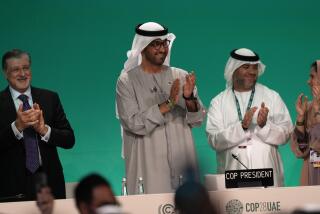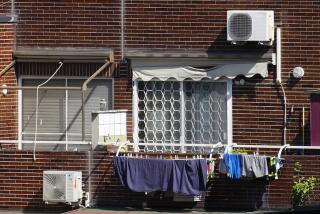Oil Crunch : Gulf Crisis Has Affluent Nations on a Conservation Kick--Again
- Share via
ROME — Belgium has brought back Mr. Energy, and Japan even asks its citizens to take smaller baths. With the Persian Gulf confrontation as a reminder, affluent nations are conserving oil once again.
A decade after Europe’s last oil crisis, Belgium is reviving heat limits in public buildings, designating in each a “Monsieur Energie” employee to watch the thermostat.
Italy has announced measures ranging from mandatory tire pressure checks to nuclear energy research.
A new spirit of conservation is emerging in Western Europe and Japan as the gulf crisis drives home the risks of heavy dependence on foreign oil.
“There’s a lot of encouragement going around; there’s the feeling that oil demand has to be curbed,” said Peter Bogin, assistant director for oil markets at Cambridge Energy Research Associates in Paris.
“What’s important is that that’s a feeling that hasn’t existed for the past five years.”
Western Europe and Japan generally have not suffered severely from the rise in oil that followed the Iraqi seizure of Kuwait on Aug. 2.
Their economies have generally had higher growth than the U.S. economy. The dollar, the currency in which oil prices are set, is relatively cheap and world oil supplies have remained fairly constant.
What the crisis has done is jar rich nations into realizing their risk if war breaks out, and many are trying to curb their thirst for oil.
In Italy, the government has decided to tighten enforcement of speed limits and pay 30% of energy-saving investments in homes or industries. It plans to invest in nuclear power research and spend $2.7 billion on extending bus and subway networks.
Japan has urged its people to drive slower, keep building thermostats at 68 degrees and curtail the schedules of 24-hour stores and TV stations.
Companies and individuals in France are allowed to write off 100% of energy-saving investments.
The measures are new versions of those introduced in the early 1970s, when the Organization of Petroleum Exporting Countries quadrupled oil prices.
That oil shock, and another in 1979-80, forced Draconian measures in oil-dependent Europe.
Some governments banned Sunday driving or forced restaurants to close early. Street and store lights were dimmed, and customers sometimes shopped by candlelight.
Europe now sees the results of its investments in alternative energy: France, for example, gets more than 80% of its electricity from nuclear plants. Norway exports electricity from its hydroelectric plants.
Even so, cheap petroleum and good economic times had encouraged Europeans and Japanese in recent years to increase their use of oil and buy bigger cars.
“People thought energy was cheap and would stay cheap, forgetting that all the conditions for instability were there,” said Joao Vale de Almeida, energy spokesman for the European Community. “You only needed someone to pull the trigger, which (Iraqi leader Saddam Hussein) did.”
According to the International Energy Agency, imported oil accounts for 18.8% of primary energy needs in the United States, 30.6% in Western Europe and 59% in Japan. Two-thirds of Japan’s oil comes from the Persian Gulf.
More to Read
Sign up for Essential California
The most important California stories and recommendations in your inbox every morning.
You may occasionally receive promotional content from the Los Angeles Times.













